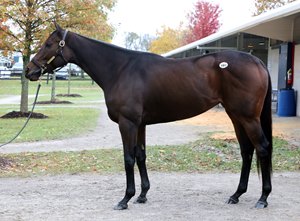KY Supreme Court Throws Out McPeek Commission Claim


A divided Kentucky Supreme Court ruled against trainer Kenny McPeek's claim for a commission on the sale of Daddys Lil Darling after his development of the multiple stakes winner led to a $3.5 million sale at auction.
Highlights of the filly's career on both dirt and turf were wins in the 2017 American Oaks (G1T), 2016 Pocahontas Stakes (G2), 2018 Modesty Handicap (G3T), and the 2017 Dueling Grounds Oaks; and runner-up efforts in the 2017 Kentucky Oaks (G1), 2017 Ashland Stakes (G1), 2017 Queen Elizabeth II Challenge Cup Stakes (G1T), and 2016 Alcibiades Stakes (G1), among others. She earned more than $1.3 million.
Shortly after owner Nancy Polk's death her heirs decided to sell Daddys Lil Darling at Fasig-Tipton's 2018 The November Sale, where the winning bid was ticketed to M.V. Magnier. McPeek issued Polk's estate an invoice for $175,000, 5% of the sale price.
The court wrote that "McPeek ... first alleged an additional term of his oral contract with Polk by sending a letter to her heirs" after hearing the filly would be sold. According to the court's opinion, however, McPeek represented in the letter "that he and Polk had several times discussed a 5% commission fee for himself if Darling was ever sold but Polk had steadfastly refused to sell, instead preferring to keep Darling as her own broodmare." McPeek's commission claim was based on his development of the filly throughout her career.
The 29-page opinion, authored by Justice Robert B. Conley, says after McPeek's claim was denied by Polk's heirs he responded by filing suit based on allegations of breach of express contract, breach of an implied contract, and a claim of "quantum meruit," a legal term meaning value of services rendered.
Fayette Circuit Court in Lexington sided with Polk's heirs, relying on a provision, part of a statutory scheme, forbidding payments of commissions connected with the sale of a horse unless there is a written agreement.
The Kentucky Court of Appeals reversed, writing McPeek's claim was not barred by the provision which, it wrote, is part of a complex law with several sections. The appellate court wrote the provision "only covers agreements to sell, purchase, or transfer horses between a buyer and a seller, or their agents. The statute requires receipts and bills of sale, neither of which would be available for the agreement between (McPeek) and (the Polk heirs). The agreement at issue in this case was an agreement to train horses. It was an agreement for services, not an agreement to sell a horse."
The Supreme Court reversed the Court of Appeals and held, in essence, the statute by its own terms "applies to any contract or agreement 'for payment of a commission, fee, gratuity, or any other form of compensation in connection with any sale, purchase, or transfer of an equine...'" The opinion also threw out McPeek's claims based on implied contract and quantum meruit, ruling the statute in question trumps such claims.
The Kentucky Supreme Court is comprised of seven justices. Chief Justice Laurance B. VanMeter recused himself from the case. Of the remaining six, four ruled in favor of Polk's heirs. Two justices found the majority view "wholly absent (of) any consideration" of the overall context surrounding the statute in question, thus failing to discern the legislative intent of the statute.
